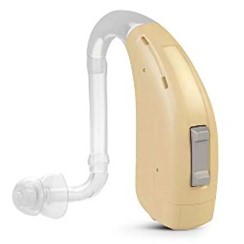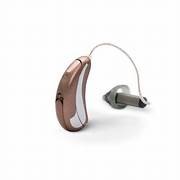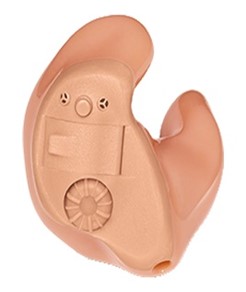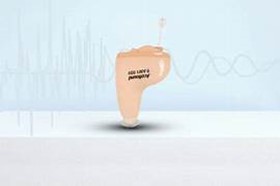Welcome to Advanced Hearing Solutions
Discover our range of cutting-edge hearing aids designed to cater to various needs and preferences. At Advanced Hearing Solutions, we're committed to improving your quality of life through better hearing.

BTE (Behind the Ear)
- Powerful and versatile
- Suitable for mild to severe hearing loss
- Easy to handle and adjust
Our BTE hearing aids offer a perfect blend of power and discretion. They sit comfortably behind the ear and are ideal for users of all ages, providing clear sound amplification for a wide range of hearing loss levels.

RIC (Receiver in Canal)
- Discreet and comfortable
- Natural sound quality
- Suitable for mild to moderate hearing loss
RIC hearing aids offer a perfect balance between visibility and performance. With the speaker placed directly in the ear canal, these devices provide exceptionally natural sound while remaining nearly invisible to others.

ITE (In the Ear)
- Custom-fit for maximum comfort
- Easy to insert and remove
- Suitable for mild to severe hearing loss
Our ITE hearing aids are custom-molded to fit perfectly in your outer ear. They offer a combination of discretion, ease of use, and advanced features, making them an excellent choice for many users.

ITC (In the Canal)
- Very discreet
- Comfortable for long-term wear
- Ideal for mild to moderate hearing loss
ITC hearing aids are designed to fit partly in the ear canal, offering a great balance between aesthetics and functionality. These devices are less visible than larger styles while still providing excellent sound quality and features.

CIC (Completely in Canal)
- Nearly invisible when worn
- Reduces wind noise
- Best for mild to moderate hearing loss
Our CIC hearing aids are the smallest and most discreet option available. Sitting deep within the ear canal, they're practically invisible to others, making them perfect for those who prioritize aesthetics alongside performance.
Who Needs a Hearing Test?
Hearing tests are essential for individuals experiencing signs of hearing loss or balance issues. At MySpeech, our skilled audiologists conduct various assessments tailored to your needs, taking into account factors such as age, medical history, and hearing history.
Steps in a Hearing Test:
- Audiological evaluation
- Otoscopic examination
- Pure tone audiometry (PTA)
- Speech audiometry
- Conditioned play audiometry
- Special tests
Hearing Test for Children
Do Children Need a Hearing Test?
Yes, children should be tested regularly to ensure their hearing is developing properly. Signs of hearing loss in children include difficulty following directions, delayed speech, or a lack of response to sounds.
Does My Child Need a Hearing Test?
If your child exhibits any of the following risk factors, a hearing test is recommended:
- A family history of congenital hearing loss.
- Premature birth and admission to the NICU.
- Low birth weight.
- Exposure to medications that may cause hearing loss.
- Blood transfusions due to neonatal jaundice or infections like meningitis or cytomegalovirus.
For further details, please refer to our resource on Could My Baby Have Hearing Loss?
What Signs Should I Look For in My Child?
It's crucial to have your child undergo a hearing screening if they:
- Do not startle or react to loud sounds.
- Struggle to focus on tasks and do not consistently respond when their name is called.
- Find it difficult to follow instructions in school, often resulting in poor academic performance.
- Seem unresponsive during conversations.
- Crank up the TV volume unnecessarily high.
- Show frustration and provide inconsistent responses, especially in noisy environments.
If you have concerns that aren't listed here, feel free to reach out and discuss your child's situation with our audiologist.
What Tests Will Be Conducted for My Child?
Our audiologists are highly trained in assessing infants, toddlers, and children, focusing on their behavioral responses to sound. The specific tests will be tailored based on your child’s age, medical history, developmental milestones, and any medical referrals. For younger children, particularly infants and toddlers, cooperation might be an issue. In such cases, they may be gently soothed to sleep or sedated under professional supervision.
Types and Degrees of Hearing Loss
At MySpeech, we understand that hearing loss can significantly impact a child's development and quality of life. Our expert team is here to guide you through the various types and degrees of hearing loss, ensuring your child receives the best care possible.
Degree of Hearing Loss:
- Normal: 0-15 dB
- Minimal: 15-25 dB
- Mild: 25-40 dB
- Moderate: 41-55 dB
- Moderately Severe: 56-70 dB
- Severe: 70-85 dB
- Profound: >90 dB
Hearing Tests for Adults
Regular hearing tests are essential for maintaining auditory health. Experts recommend that individuals have their hearing evaluated every ten years until age 50, and then every three years thereafter. Early detection of hearing loss can significantly enhance the success of treatment and intervention. Factors contributing to hearing loss include exposure to loud sounds at work or through music, excessive earwax buildup, head injuries, ototoxic medications, and genetic predisposition.
During a comprehensive hearing test, several assessments are performed:
- Otoscopy: The audiologist examines your ear for wax or abnormalities.
- Pure Tone Audiometry (PTA): You’ll listen through headphones to determine the softest sounds you can hear.
- Bone Conduction Audiometry: This assesses hearing loss type by sending sound through the bone.
- Speech Testing: You’ll repeat words to evaluate speech understanding.
- Acoustic Reflex Testing (ART): Measures involuntary muscle responses to sound.
- Tympanometry: Assesses fluid buildup or perforations in the ear.
- Brainstem Evoked Response Audiometry (BERA): Records nerve responses to sounds.
If hearing loss is detected, hearing aids may be recommended. Various types include:
- BTE (behind the ear)
- RIC (receiver in the canal)
- ITE (in the ear)
- ITC (in the canal)
- CIC (completely in the canal)
Each type is designed to fit different levels of hearing loss and user preferences, ensuring that you can enjoy better communication and a higher quality of life.
Special Education Support
At MySpeech, we also offer insights into special education resources. Children who qualify for special education receive Individualized Education Programs (IEPs) tailored to their specific needs. These programs ensure they get personalized teaching and resources at no cost to families, focusing on both strengths and challenges.
Who Qualifies for Special Education?
According to the Individuals with Disabilities Education Act (IDEA), children aged 3 to 21 may qualify for special education services if they meet specific criteria:
- They must have a documented disability in one of the 13 categories defined by IDEA.
- They need special education to access the general curriculum effectively.
Occupational Therapy Services
We also provide Occupational Therapy (OT), a vital branch of healthcare designed to assist individuals of all ages facing physical, sensory, and cognitive challenges. Our OT services empower children to regain independence in daily activities, enhancing their overall well-being.
Book an Appointment Today!
If you suspect your child may be experiencing hearing loss or needs additional support, don’t hesitate to contact us at MySpeech. Our dedicated team is here to provide the comprehensive assessments and personalized care your child deserves. Let us help you take the first step towards a brighter future—book your appointment today!

